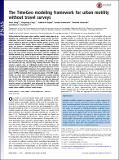The TimeGeo modeling framework for urban motility without travel surveys
Author(s)
Athavale, Shounak; Jiang, Shan; Yang, Yingxiang; Gupta, Siddharth; Veneziano, Daniele; Gonzalez, Marta C.; ... Show more Show less
DownloadJiang-2016-The TimeGeo modeling.pdf (2.022Mb)
PUBLISHER_POLICY
Publisher Policy
Article is made available in accordance with the publisher's policy and may be subject to US copyright law. Please refer to the publisher's site for terms of use.
Terms of use
Metadata
Show full item recordAbstract
Well-established fine-scale urban mobility models today depend on detailed but cumbersome and expensive travel surveys for their calibration. Not much is known, however, about the set of mechanisms needed to generate complete mobility profiles if only using passive datasets with mostly sparse traces of individuals. In this study, we present a mechanistic modeling framework (TimeGeo) that effectively generates urban mobility patterns with resolution of 10 min and hundreds of meters. It ties together the inference of home and work activity locations from data, with the modeling of flexible activities (e.g., other) in space and time. The temporal choices are captured by only three features: the weekly home-based tour number, the dwell rate, and the burst rate. These combined generate for each individual: (i) stay duration of activities, (ii) number of visited locations per day, and (iii) daily mobility networks. These parameters capture how an individual deviates from the circadian rhythm of the population, and generate the wide spectrum of empirically observed mobility behaviors. The spatial choices of visited locations are modeled by a rank-based exploration and preferential return (r-EPR) mechanism that incorporates space in the EPR model. Finally, we show that a hierarchical multiplicative cascade method can measure the interaction between land use and generation of trips. In this way, urban structure is directly related to the observed distance of travels. This framework allows us to fully embrace the massive amount of individual data generated by information and communication technologies (ICTs) worldwide to comprehensively model urban mobility without travel surveys.
Date issued
2016-08Department
Massachusetts Institute of Technology. Department of Civil and Environmental Engineering; Massachusetts Institute of Technology. Norman B. Leventhal Center for Advanced UrbanismJournal
Proceedings of the National Academy of Sciences
Publisher
National Academy of Sciences (U.S.)
Citation
Jiang, Shan; Yang, Yingxiang; Gupta, Siddharth; Veneziano, Daniele; Athavale, Shounak and González, Marta C. “The TimeGeo Modeling Framework for Urban Motility Without Travel Surveys.” Proceedings of the National Academy of Sciences 113, no. 37 (August 2016): E5370–E5378. © 2016 National Academy of Sciences.
Version: Final published version
ISSN
0027-8424
1091-6490